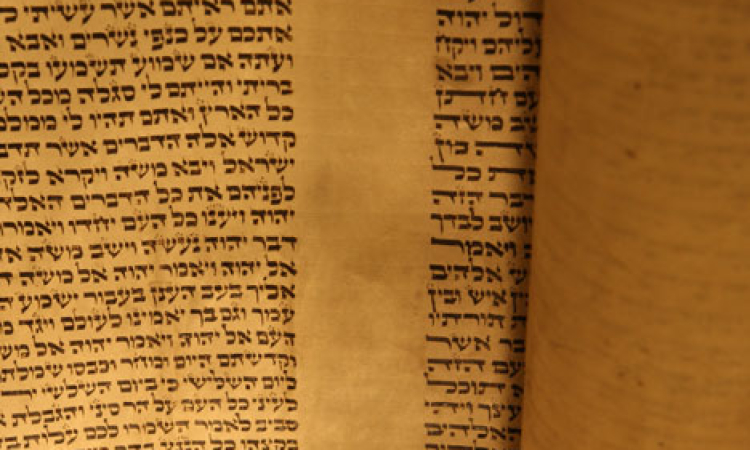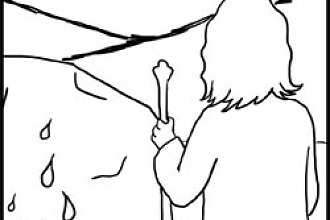Parasha for the Week: Bereshit: Genesis 1:1 - 6:8
Aftarah for the Week: Isaiah 42:5 - 43:10
Besorat Yeshua: Mark 10:1 - 16
Overview
In the beginning, God creates the earth out of nothingness in 6 days.
On the seventh day, God rests, bringing into existence the spiritual universe of Shabbat, which returns to us every seven days.
Adam and Chava - the Human pair - are placed in the Garden of Eden.
Chava is enticed by the serpent to eat from the forbidden fruit of the "Tree of Knowledge of Good and Evil," and in turn gives the fruit to Adam.
By absorbing "sin," Adam and Chava render themselves incapable of remaining in the spiritual paradise of Eden and are banished
Death and hard work (both physical and spiritual) enter the world, with pain in childbirth.
Now begins the plan of salvation God established to save humanity from sins, salvation will come from an offspring of the women, known later as the Mashiach. This salvation will be the main subject of world history.
Cain and Abel, the first two children of Adam and Chava, bring offerings to God. Abel gives the finest of his flock, his offering is accepted, Cain gives produce and his offering is rejected.
In the ensuing quarrel, Cain kills Abel and is condemned to wander the earth.
The Torah traces the genealogy of the other children of Adam and Chava, and the descendants of Cain until the birth of Noach.
After the death of Seth, Mankind descends into evil, and G-d decides that He will blot out Man in a flood which will deluge the world. However, one man, Noach, finds favor with God.
"Torah's Wisdom "
Torah must influence the behavior and character of the one who stud¬ies it to qualify as Torah. A person possesses wisdom; Torah possesses the person. Torah is compared to fire, for like fire it must leave an imprint. Where study of the Torah does not transform the student, whatever knowledge he obtains is not Torah but secular wisdom. The blessing recited upon seeing one who pos¬sesses exceptional secular wisdom is "Blessed are You, Hashem, our God, King of the uni¬verse, Who has given of His knowledge to hu¬man beings." The wisdom is given uncondi¬tionally; its recipient remains flesh and blood.
"The Choice of a Partner"
The Torah states: "And the Lord, God, said, 'It is not good that that man be alone, I will make a helper corresponding to him." (Genesis 2:18) Getting married can be a frightening thing. Is this the one? Maybe I could do better? Maybe I could find someone nicer? By choosing a partner, necessarily we close ourselves off from every other possibility. At a time like this, the greatest bless¬ing a prospective couple can have is the knowl¬edge that their choice is the result of Divine Providence rather than their own wish list.
"The Torah Was Given to Explain to God's People His Purpose"
The ultimate purpose of God's people is to be "a nation of kohanim (priests), a holy nation." (Exodus 19:6; 1Peter 2:9) As kohanim we are God's representatives in this world, and that requires us to be a holy nation. That holiness must permeate every as¬pect of life, from the ostensibly mundane-eat¬ing, sleeping, dressing in the morning -- to the most elevated. Each of the divinely decreed actions of God's People must proclaim His existence. To achieve this goal, we must be a nation that dwells apart from other cultures. The Midrash tells us that God's people are compared to oil, and the nations of the world to water. By their very nature they cannot mix. When we recognize the importance of main-taining our unique, holy existence the oil flows calmly on the water, and the two coexist in peace.
"We Have Been Created in the Image of God"
The Torah states: "Then the Al¬mighty formed man from the dust of the ground and breathed into his nos¬trils the breath of life; and man became a living soul." (Genesis 2:7)
Rabbi Samson Raphael Hirsch, writes "Every fiber of your body is a creation of the hand of the Almighty. Your spirit, the spark of the Di¬vine, your personality, invisible as Deity itself, weave and work in this microcosm and control your intellect and your body. Learn to deem yourself holy as a creature of the Almighty and consecrate yourself to your mission as a 'ser¬vant of the Creator.' "We live in a time when many people suffer from feelings of inferiority. But a person who lives with the reality that he is created in the image of the Creator of the universe will feel so positive about himself that he cannot pos¬sibly have inferiority feelings. The more you integrate this concept, the more you will show honor and respect to others, for they too are created in the Almighty's image, and the bet-ter you will feel about yourself"
"Marriage"
The Torah states: Hence a man leaves his father and mother and clings to his wife, so that they become one flesh." (Genesis 2:24).
Four good questions to ask before getting married: If you cannot answer "Yes", don't marry the person you are dating.
1. Are we equally yoked?
Do we balance and match each other in our character traits and most importantly do we share the same beliefs, understanding, convictions, and walk with God?
2. Do I respect this person enough that I want to be more like him/her?
Respect is crucial in any relationship, par¬ticularly marriage. The litmus test for respect is determining if you want to emulate this person. What qualities do you respect in this person? Would you be happy if your child turns out like him/her?
2. If his/her personality and habits stay exactly as they are today, will I be happy 20, 30, 40 years down the road?
Never marry potential. If you can't be happy with the person the way he or she is now, don't get married. Don't expect to change another per¬son. You'll be frustrated and they'll be resentful. Can you accept this person exactly as they are, for the rest of your life?
3. Do we share common life goals and priorities?
Sure, chemistry and common interests are important. However, make sure you share the deeper level of connection that comes through sharing life goals. To avoid growing apart after marriage, figure out what you're living for while you're single and then find someone who inde¬pendently came to the same conclusion as you.
A soul mate is really a goal mate - two people who ultimately share the same understanding of life's purpose and therefore share the same pri¬orities, values and goals.
The majority of marriages today end in divorce. Those who answer "yes" to each of these three questions have a good chance in succeeding to build a happy marriage. Those who cannot an¬swer "yes" to all three questions are likely enter¬ing a marriage that will leave them disappointed, unhappy, single again, and in a worse situation than before they started.
AFTARAH Isaiah 42:5 - 43:10
This text of Isaiah is parallel with the text of Bereshit reminding God's people why God has also created his people. Everyone is part of the creation of God, everyone receives the breath of God and His spirit. "Thus says God, the LORD, who created the heavens and stretched them out, who spread out the earth and what comes from it, who gives breath to the people upon it and spirit to those who walk in it" (Isaiah 42:5). "His people has been given a special covenant, a great privilege, but also a commission to be a Light to the Nation, I have given you as a covenant to the people, a light to the nations..." (Isaiah 42:6). "All the nations are going to sing to the Lord and to praise him for his goodness. Sing to the LORD a new song, his praise from the end of the earth!" (Isaiah 42:10). But God's people are deaf and blind. "Listen, you that are deaf; and you that are blind, look up and see! Who is blind but my servant, or deaf like my messenger whom I send? Who is blind like my dedicated one, or blind like the servant of the LORD?'" (Isaiah 42:18-19) The Lord will forgive his people and will call them again to witness for Him, "Bring forth the people who are blind, yet have eyes, who are deaf, yet have ears! Let all the nations gather together, and let the peoples assemble. You are my witnesses, says the LORD, and my servant whom I have chosen." (Isaiah 43:8-10). Because he redeemed them and loved them, But now thus says the LORD, he who created you, O Jacob, he who formed you, O Israel: Do not fear, for I have redeemed you; ... For I am the LORD your God, the Holy One of Israel, your Savior... you are precious in my sight, and honored, and I love you, ... Do not fear, for I am with you; ... everyone who is called by my name, whom I created for my glory, whom I formed and made." (Isaiah 43:1-7).
BESORAT YESHUA Mark 10:1 - 6
Parasha: The parasha of this week is Bereshit, the first parasha of the books of Moses. God created Man and Woman and God gave them two gifts in order to be happy for eternity. These two gifts are the Marriage and the Shabbat. Today these two God's gifts are questioned. People don't want anymore to be married and this world is not done and organized for the Shabbat,
Besorah: At the time of Yeshua, the Shabbat was not yet questioned by God's people, the marriage was much more in question. In parallel with this parasha we have the discussion of Yeshua with the Pharisees and his talmidim about the marriage and divorce: "Some Pharisees came, and to test him they asked, "Is it lawful for a man to divorce his wife?" He answered them, "What did Moses command you?" They said, "Moses allowed a man to write a certificate of dismissal and to divorce her." But Y'shua said to them, "Because of your hardness of heart he wrote this commandment for you. But from the beginning of creation, 'God made them male and female.' 'For this reason a man shall leave his father and mother and be joined to his wife, and the two shall become one flesh.' So they are no longer two, but one flesh. Therefore what God has joined together, let no one separate." Then in the house the disciples asked him again about this matter. He said to them, "Whoever divorces his wife and marries another commits adultery against her; and if she divorces her husband and marries another, she commits adultery." ..." (Mark 10:2-12)
Besora: There are some topics that are difficult to accept or to believe, the topic of the creation is particularly difficult to believe, especially these days when so many scientific would like to convince us that, the account of the creation is not acceptable: Yeshua says "Let the little children come to me; do not stop them; for it is to such as these that the kingdom of God belongs. Truly I tell you, whoever does not receive the kingdom of God as a little child will never enter it." (Mark 10:14; 15).








